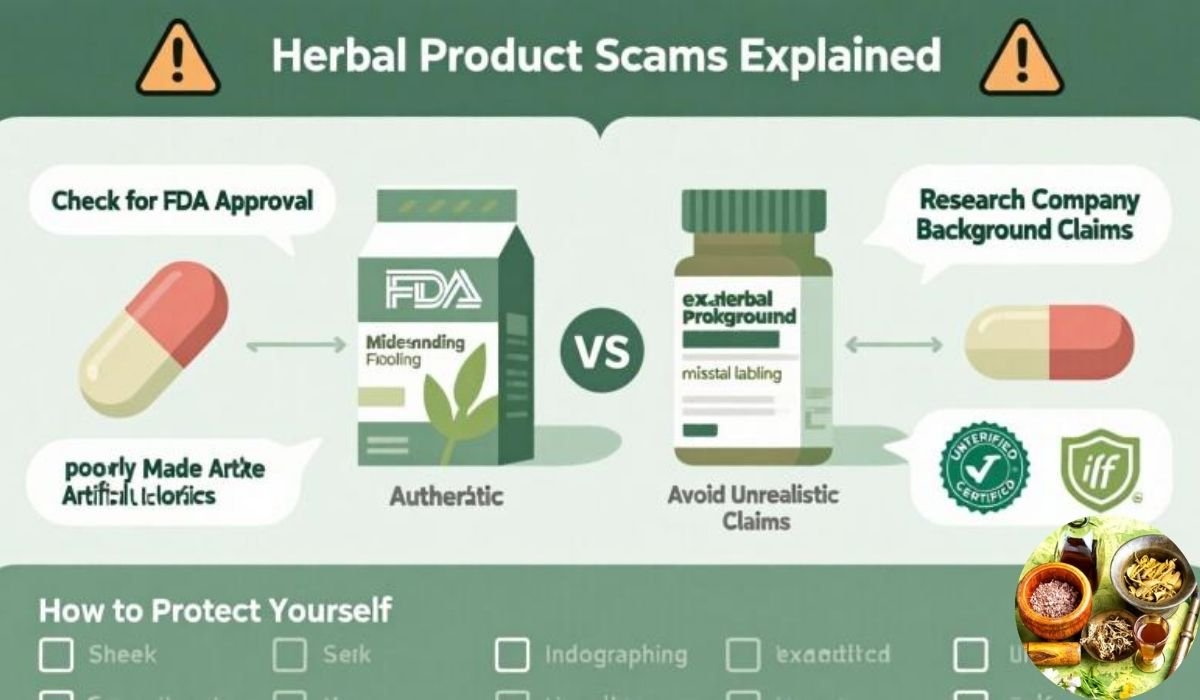Health
Herbciepscam Explained: How to Spot and Avoid Herbal Product Scams

The internet is full of health promises, and herbal products are at the center of many of them. From teas that claim to melt away stress to capsules that promise miracle cures, the natural wellness market has exploded. But with this growth comes risk. A strange new word—herbciepscam—has started to appear in online conversations, often linked with scam warnings and suspicious websites. While the term itself is not a recognized medical phrase, it clearly signals a concern about herbal scams.
This article takes a deep look at what herbciepscam might mean, why herbal products are so attractive to consumers, and how scams use them as bait. More importantly, it gives you practical tools to stay safe, spot red flags, and make smarter choices when browsing health claims online.
Quick Bio Information
Herbal Supplements Market Value: Over $150 billion globally by 2025.
Regulation: Supplements in the U.S. are regulated as food, not drugs.
Popular Herbs: Ashwagandha, turmeric, milk thistle, ginseng, chamomile.
Common Risks: Contamination, mislabeling, drug interactions.
FDA Role: Cannot approve supplements before they reach the market.
Scam Tactics: Fake reviews, miracle claims, urgency tactics.
Safe Payment: Credit cards and PayPal offer better protection.
Trusted Certifications: USP, NSF, GMP for quality assurance.
Consumer Tip: Always search product + “scam” before buying.
Global Use: Herbal medicine is practiced in over 80% of countries.
What Does Herbciepscam Mean
Herbciepscam is not something you will find in a dictionary or medical textbook. Instead, it looks like a mash-up of words that serves as a warning. “Herb” obviously refers to herbal products—teas, powders, supplements, oils, and creams marketed as natural remedies. “CIEP” is more puzzling. It could be a made-up acronym designed to sound professional, a fake company name, or even a technical-sounding phrase meant to confuse. Scammers often use this kind of vague terminology to give their products an air of authority. And then, of course, we see the word “scam,” which is the real giveaway.
Put together, herbciepscam seems to represent fraudulent activity involving herbal products—likely fake supplements, misleading wellness claims, or deceptive online marketing schemes. Even if the word itself is new, the problem it describes is very real.
People Also Read: How ProcurementNation.com Supply Chain Is Changing Global Procurement
Why Herbal Products Are So Popular Online
Herbal remedies are nothing new. For thousands of years, people across cultures have used plants to heal, relax, and support overall well-being. Today, this tradition has merged with modern marketing. You can now order herbal teas, powders, tinctures, oils, and capsules with a single click.
Commonly used herbs include chamomile for relaxation, aloe vera for skin, turmeric for inflammation, ashwagandha for stress, and milk thistle for liver support. Wellness influencers on social media often highlight these products, while countless online stores push them as part of a “natural lifestyle.”
For many, the attraction lies in the idea that herbs are safer than pharmaceuticals. Others seek affordable alternatives to expensive prescriptions. Some just like the idea of supporting health in a more natural way. This huge demand has opened the door for legitimate companies—but also for scams.
The Risky Side: Herbal Products vs Prescription Drugs
One of the biggest differences between herbal products and prescription medicine is regulation. Prescription drugs go through years of testing, strict safety trials, and FDA approval before they ever reach the public. Their ingredients, effects, and risks are well-documented.
Herbal products, on the other hand, are often treated like food items rather than medicine. In the United States, companies can sell most supplements without proving that they work or are safe, as long as the ingredients are not new to the market. That means a product can be launched with bold claims but without the scientific evidence to back them up.
This looser regulation creates an opening for herbciepscam-style schemes. Scammers can package cheap powders or untested extracts, slap on a fancy label, and market them as miracle cures without facing the same level of scrutiny as drug manufacturers.
The Natural Equals Safe Myth
A common misconception about herbal remedies is that if something is “natural,” it must be safe. Unfortunately, this is not always true. Nature is full of plants that can cause harm—belladonna and poison ivy are just two obvious examples. Even familiar herbs can be dangerous in concentrated doses or when mixed with prescription medications.
For example, St. John’s Wort, often marketed for mood support, can interfere with antidepressants, birth control pills, and other medications. Ginkgo biloba, promoted for memory, may increase bleeding risk when taken with blood thinners. And even something as common as green tea extract can cause liver damage in very high amounts.
This is where scammers thrive. They lean on the “natural” label to convince people a product is harmless, even when it may be poorly tested, contaminated, or mislabeled. The herbciepscam issue is not about herbs themselves—it’s about the false security scammers create around them.
How Herbal Scams Work
Scammers have mastered the art of making products look legitimate. A herbciepscam often uses the same marketing playbook:
They lure buyers with promises of miracle cures, often claiming that mainstream medicine is hiding the “real” solution. They create urgency by saying stock is limited or time is running out. They sprinkle in vague scientific jargon, invented acronyms, or fake endorsements to sound credible. And they hide key information—like ingredients, company addresses, or refund policies—so consumers have little to verify.
Once you pay, the product you receive may be ineffective, contaminated, or never arrive at all. And in some cases, the goal is not just money but also your personal data.
Red Flags to Spot a Herbciepscam Quickly
Spotting a scam is easier when you know what to look for. Some of the most common red flags include bold claims like “cures cancer overnight” or “melts fat without effort,” which are not legally allowed for supplements. Another warning sign is heavy pressure to “buy now” with countdown timers or pop-ups.
Legitimate companies are usually clear about ingredients, manufacturing standards, and customer service contacts. Scammers often provide vague details, fake addresses, or no way to reach them at all. Reviews can also be a giveaway. If every testimonial looks suspiciously perfect, uses the same phrases, or appears only on the seller’s site, be skeptical.
Payment requests are another clue. Asking for cryptocurrency, gift cards, or wire transfers should raise alarm bells. Real businesses typically accept secure, traceable payments.
How to Protect Yourself Online
Protecting yourself from herbciepscam-type fraud requires a mix of research and caution. Always start by looking up the company name along with keywords like “scam,” “review,” or “complaints.” A quick search can reveal warnings from other consumers.
Check that the website is secure by looking for “https” and a padlock icon in the browser. Read the site carefully: does it have a privacy policy, terms of service, and professional design? Poor grammar, missing details, and vague promises are often signs of a scam.
It’s also wise to compare with reputable supplement companies. Trusted brands often display certifications like USP, NSF, or GMP, showing that their products meet quality standards.
What to Do If You’ve Been Scammed
Falling for a scam can feel embarrassing, but it happens to many people. The important thing is to act quickly. Report the incident to the Federal Trade Commission (FTC) or your country’s consumer protection agency. If you paid with a credit card or bank account, contact your provider immediately to block further charges and attempt a refund.
Keep records of all emails, screenshots, and receipts. These may help in resolving disputes. Sharing your experience online—through forums, watchdog sites, or reviews—can also help warn others about the same scam.
Safer Alternatives for Herbal Buyers
The good news is that not all herbal products are scams. Many are safe, effective, and helpful when chosen carefully. To find trustworthy options, look for companies that invest in third-party testing and openly share their results. Certifications like NSF International, United States Pharmacopeia (USP), or Good Manufacturing Practices (GMP) can provide reassurance.
It is also smart to consult with a doctor or pharmacist before trying new supplements, especially if you take prescription medications. They can help you avoid harmful interactions and guide you toward products with stronger scientific backing.
Building a Scam-Smart Mindset
Ultimately, protecting yourself comes down to mindset. Being curious and critical does not mean being paranoid—it means asking smart questions. When you see a product online, ask: Who is selling this? Is there real scientific proof? Does this claim make sense?
Scammers succeed when people act on emotion and urgency. Taking a moment to pause, reflect, and research can prevent a bad decision. If it sounds too good to be true, it probably is. The more you practice this mindset, the less likely you are to fall for herbciepscam or any similar scheme.
Conclusion – Navigating Herbal Products Safely
Herbciepscam may be a new term, but it represents an old problem: scams that exploit people’s trust in natural health. Herbal products can be helpful and enriching, but they also provide fertile ground for fraud. By learning to recognize red flags, verifying before buying, and maintaining a scam-smart mindset, you can enjoy the benefits of herbal wellness without falling into traps.
The online world is full of opportunity, but also risk. Staying cautious, informed, and curious is the best defense against herbciepscam and every other misleading promise in the digital marketplace.
FAQs About Herbciepscam
What Is Herbciepscam?
Herbciepscam is an informal term that appears online to describe scams involving herbal products. It combines the words herb, CIEP, and scam to warn consumers of fraud.
Why Do People Fall for Herbal Scams?
Many people believe natural products are safer, cheaper, or offer miracle cures. Scammers take advantage of these hopes with emotional marketing.
Are Herbal Products Safe?
Some are safe and effective, but others may be contaminated, mislabeled, or harmful when taken in the wrong dose or combined with prescription drugs.
How Can I Spot a Herbal Scam?
Watch for miracle cure claims, vague ingredient lists, fake reviews, pressure to buy quickly, or unusual payment requests.
What Should I Do If I Get Scammed?
Report the fraud to consumer protection agencies, alert your bank, and share your experience to help others avoid the same scam.
Can Herbal Products Really Work?
Yes, some herbs like chamomile or turmeric have proven benefits, but effectiveness depends on quality, dosage, and individual health needs.
What Is the Safest Way to Buy Herbal Products?
Choose reputable brands with third-party certifications, check for transparent labeling, and consult with a healthcare professional before use.

 Celebrity5 months ago
Celebrity5 months agoChris Rock Net Worth: How the Comedy Icon Built His $60 Million Fortune

 Entertainment5 months ago
Entertainment5 months agoDiscover Totallyndfw: Your New Go-To Hub for Fun and Fresh Content

 Celebrity5 months ago
Celebrity5 months agoEian Burton: Life, Family, and the Story Behind LeVar Burton’s Son

 internet5 months ago
internet5 months agoPuppygirlxd: Exploring the Viral Online Persona Taking Over Social Media


















